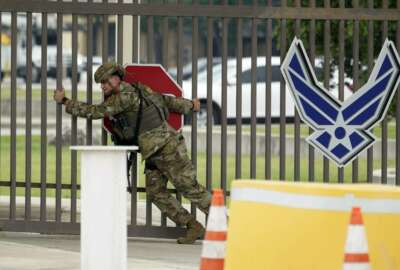To listen to the Federal Newscast on your phone or mobile device, subscribe in PodcastOne or Apple Podcasts. The best listening experience on desktop can be found using Chrome, Firefox or Safari.
- Unvaccinated federal employees who refuse COVID-19 testing may face discipline from their agencies. The Biden administration said agencies can bar an employee who refuses new testing protocols from the workplace while they sort out the disciplinary process. It also clarified, employees should get tested on duty time and at the agency’s expense. Unvaccinated employees and contractors who telework regularly won’t face weekly testing. And agencies can’t require telework as an alternative for anyone based solely on their vaccination status. (Federal News Network)
- The Census Bureau was the target of a cyber attack but investigators reassured the 2020 decennial count was unaffected. The Census Bureau’s Office of Inspector General said hackers tried infiltrate some of the agency’s remote access servers in January, but failed. The IG said Census missed opportunities to limit its vulnerability, and that the attack was not discovered in a timely manner. Investigators said the agency did not to keep sufficient system logs, and it was using an outdated operating system. And even though the Census firewalls blocked hackers trying to get through a back door, they still managed to make unauthorized user accounts.
- The Army is seeking whitepapers on artificial intelligence applications that align with its research goals for the next five years. The Army Futures Command released a broad agency announcement that outlined 11 areas of artificial intelligence it’s interested in, including autonomous ground and air platforms, visualizing large datasets and processors for detecting various threats, among others. Interested companies can submit their research to AFC on or before July 2026. Grants and contracts will be awarded to some of these organizations.
- Military bases are beginning to restrict travel again as coronavirus rates are on the rise. For a while, the Defense Department had 95% of its bases restriction-free for the first time since the pandemic started. Service members were able to move to new orders or travel without waivers. But, as COVID-19 numbers are increasing, especially in the south, bases are once again putting the kibosh on nonessential travel. Eleven percent of bases have put their restrictions back into place. DoD says it will continue to change the status of travel restrictions as the pandemic situation changes.
- Families of veterans who committed suicide would have access to mental health services under a new bill in Congress. Rep. David Rouzer (R-N.C.) introduced the Expanding the Families of Veterans Access to Mental Health Services Act, which would allow these family members to use Vet Center readjustment counseling in coping with the effects of suicide. VA offers emergency mental health care 24/7 at VA medical centers. Tele-mental health services are also available.
- Army Emergency Relief is helping soldiers get their furry friends to overseas orders with them. COVID-19 caused shipping costs to rise and made it untenable for some soldiers to bring their pets to orders in other countries. AER is offering up to $5,500 in grants or interest-free loans for shipping costs. The program is open to all active duty, reserve and Guard members.
- The Agriculture Department avoided at least $50 million in costs thanks to its IT partnership with the General Services Administration. USDA closed 31 of 37 data centers. It launched a new centralized USDA cloud office that provides multi-cloud services. And it consolidated over a dozen contact centers and modernized USDA.gov. The department became GSA’s first Centers of Excellence customer back in 2018. GSA said USDA improved its customer service approval ratings on the Farm Loan program by 3.5% because of their work together.
- U.S. Citizenship and Immigration Services is trying to catch up on IT modernization efforts. Technical debt has been a pain point for the agency, but increased communication between different teams can help upgrade outdated software. Chief Information Security Officer Shane Barney said USCIS will likely never get in front of its technical debt, since new weaknesses are always surfacing, but the agency can still reduce it. The shift to automation will help close this gap, Barney says. (FCW)
- The Small Business Administration has new leadership in three dozen key roles, including the Office of Government Contracting and Business Development. SBA named Bibi Hidalgo as the new associate administrator of GCBD, which oversees the 8(a) and HUBZone programs and many other efforts to increase the number of contracts for small firms. Prior to the SBA, Bibi served as a policy lead for the Biden-Harris transition. In the private sector, she co-founded Future Partners, which advises state and local governments, union leaders, and Fortune 50 corporate executives.
- The president announced the nomination of Charles Sams III to lead the National Park Service. The agency has not had a Senate-confirmed director since the Obama administration, with the Trump administration using four acting-directors over four years and never announcing a formal nominee. Sams, a Navy veteran, is of Native American heritage and if confirmed would be the first Park Service head to be an enrolled tribal member. The nomination now moves to the Senate for consideration.
Copyright
© 2024 Federal News Network. All rights reserved. This website is not intended for users located within the European Economic Area.
